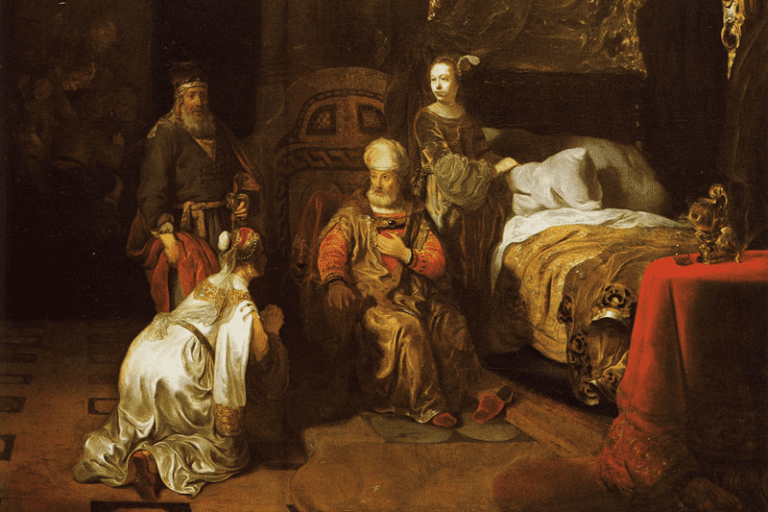I previously made the claim that patriarchy—rather than polygamy—is the primary source of problems in biblical polygamous marriages. I then examined in-depth the polygamous marriages of Abram and of Jacob. As promised, I will now examine the marriages of David and of his son, Solomon.
Trigger warning: This scriptural account contains coercion, rape, and other abuses.
Kings

Because David and Solomon are kings, we should make an important observation before considering the narrative.
Although scripture never prohibits polygamy in general, it does include the command, “Your king must not acquire numerous wives and so be led astray” (Deuteronomy 17:17).1 So as kings, David and Solomon both start off on shakier ground than other men for their multiple wives.
However, this command does not specify how many wives are too many. The same Hebrew word for “numerous” is used in the previous verse for “acquire numerous horses” and then again for “amass for himself silver and gold.” So while it prohibits kings from having an unspecified large number of wives, it probably does not mean that kings may have only one wife. Whether David or Solomon have enough wives to violate this command is a question worth asking.
King David
For David, two passages suggest that his wives were not too many. In 2 Samuel 12:8, Yahweh says to David, “I gave you your master’s daughter and his wives to be your own, I gave you the daughters of Israel and Judah.” If it’s true that God gave David his wives, then David could not be violating God’s command by marrying them.
And 1 Kings 15 says that “David had done what was right in the eyes of the Lord and had not disobeyed any of his commandments all his life, except in the matter of Uriah the Hittite.” If taken at face value, this too would mean that all of David’s marriages (with the possible exception of his marriage to Bathsheba) are acceptable to God. However, we really can’t take this verse seriously, as David is recorded to have done quite a number of things that are not “right in the eyes of the Lord.”
King Solomon
As for Solomon, he is said to have “seven hundred wives, all princesses, and three hundred concubines” (1 Kings 11:3). If I were to take these numbers literally, then I’d be fairly certain that Solomon violates the command by having too many wives. However, that would also mean he’d have a different royal wedding every three weeks for the entirety of his reign—and that’s in addition to his three hundred concubines on the side. I think it’s safe to say that these numbers should not be taken literally.
Furthermore, the text does invoke a specific command that Solomon violates in regard to his marriages, but it isn’t the command against “numerous wives” from Deuteronomy 17:17. Instead, 1 Kings 11:2 suggests that Solomon violates the command against intermarrying with foreigners, which is found in Deuteronomy 7:3–4.
Michal
Let’s now take a look at David’s marriages. After David kills Goliath, King Saul brings him into his own household (1 Samuel 18:2). Because of David’s continued successes, Saul places him in command of the fighting forces (v. 5). But as David’s fame and popularity grows, Saul becomes jealous and suspicious (vv. 6–9).
Having failed at several attempts to kill David, Saul decides to use his daughters as bait. He first offers David his oldest daughter, Merab, on the condition that he continue to fight the Philistines—hoping they would kill David for him (v. 17). But David refuses, and Merab is given to someone else (vv. 18–19).
Saul then learns that another of his daughters, Michal, has fallen in love with David, and he exploits her love to suit his plans (v. 20). He makes David the same offer as before, only with Michal, and David again refuses (v. 21–23). But this time, Saul adds a specific request for a bride-price—one hundred Philistine foreskins; “Saul was counting on David’s death at the hands of the Philistines” (v. 25). This request satisfies David, and he agrees, but instead of dying at the hands of the Philistines, David acquires twice the number of foreskins requested (vv. 26–27).
So David marries Michal as his first wife. Saul continues to plot against David, and Michal eventually helps David escape from her father (19:11–17). Away from Saul, David gathers a following of men loyal to him.
Abigail & Ahinoam
While living in the wilderness of Paran, David sends some of his men to a wealthy man named Nabal, wishing him well and asking for food as repayment for the protection they had given his shepherds (25:1–8). Nabal refuses, and David prepares his men to attack him (vv. 9–13).
But Nabal has a wife, named Abigail, whom the text describes as “a beautiful and intelligent woman” (v. 3). Abigail learns what has happened, and she prudently takes the requested food to David and his men, without her husband knowing about it, thus avoiding any bloodshed (vv. 14–35). Abigail then returns to Nabal, and after he has soberred from his drinking, she tells him what she did, at which point he has a seizure, and he dies ten days later (vv. 36–38).
David then takes Abigail as an additional wife (vv. 39–42). Right after describing David’s marriage to Abigail, the text informs us that “David had also married Ahinoam of Jezreel; both these women became his wives” (v. 43) and that “Saul meanwhile had given his daughter Michal, David’s wife, to Palti son of Laish from Gallim” (v. 44).
Maach, Haggith, Abital, Eglah & others
Eventually, Saul and his sons die (ch. 31). David and his two current wives move to Hebron (2 Samuel 2:1–3). And the men of Judah anoint David as their king (v. 4).
At some unspecified point, David acquires other wives—Maach, Haggith, Abital, and Eglah—of whom the text only says that they, as well as Ahinoam and Abigail, each bear David a son (3:2–5). Here we again see women patriarchally defined by their ability to produce a male heir.
David then demands Michal back from Paltiel, asserting his ownership based on what he paid for her. “Hand over to me my wife Michal for whom I gave a hundred Philistine foreskins as the bride-price” (v. 14). Michal may once have truly loved David, but David treats her like property.
All the elders of Israel eventually anoint David as king over the whole nation (5:1–3). David then conquers Jerusalem and makes it his capital (vv. 6–9). There he takes unspecified additional concubines and wives, and he has more children (13–16).
At a later point, in celebration of the Ark’s recovery, David dances vigorously before God, and Michal—no longer so enamored with David—“despised him in her heart” (6:16). When Michal confronts David about exposing himself in front of slave-girls, David rebukes her (vv. 20–22). Then the text, implying as usual that God sides with the man, says that “To her dying day Michal, Saul’s daughter, was childless” (v. 23). And once more, the patriarchal text reduces a woman to her fertility.
Bathsheba
We come now to the most well known of David’s wives—Bathsheba.
While David’s army is out battling Ammon, David remains in Jerusalem (11:1). Walking on his palace roof one evening, he sees a woman bathing, and rather than look away, he chooses to continue invading her privacy with his gaze (v. 2).
An astounding number of commenters have claimed that Bathsheba deliberately exposed herself to the palace, with the intention of seducing the king. Here’s how Tikva Frymer-Kensky responds to this claim:
If she wanted to bathe, where else would she be? It is spring, when the cisterns and water jugs on the roof stand full of the winter’s rain. And when better to bathe but in the cool of late afternoon, after the day’s work is done? To say that Bathsheba set out to entice the king is to say that violated women “were asking for it” because they smiled, or wore tight clothes, or went to a club. (Reading the Women of the Bible, pp. 144–145)
And Diana R. Garland and David E. Garland put it this way:
It is simply male fantasy to think that women are being seductive when they are in fact being exploited…. The law required ritual washing at the conclusion of her menstrual period. A woman would be highly unlikely to conduct such a cleansing from her menstrual period as a comeon. If she were in public view, she would have washed without disrobing. There is no reason even to assume that she was naked. Public nudity was not acceptable in this ancient Jewish culture but instead was considered shameful. There is no foundation for assuming she was some kind of exhibitionist. (“Bathsheba’s Story: Surviving Abuse and Loss,” p. 23)
To suggest that Bathsheba was in any way responsible for David’s gaze is victim blaming, plain and simple. It stems from the worst impulses of rape culture, and it is reprehensible.
As the narrative continues, David orders for Bathsheba to be brought to the palace, and then he rapes her (v. 4). To call David’s actions anything less than rape would be to do further violence to Bathsheba’s memory. The power dynamics between Bathsheba and the king are such that she has no possible option for true consent. Here again are Garland and Garland:
Since consent was impossible, given her powerless position, David in essence raped her. Rape means to have sex against the will, without the consent, of another – and she did not have the power to consent. Even if there was no physical struggle, even if she gave in to him, it was rape. (“Bathsheba’s Story,” p. 25)
Bathsheba conceives, and she informs David of her pregnancy (v. 5). In order to cover it up, David then attempts to get Bathsheba’s husband, Uriah, to have sex with her (vv. 6–13). Having failed, David then orders Joab to have Uriah stranded in battle, and Uriah is killed accordingly (vv. 14–25). Bathsheba then mourns her dead husband, and as soon as her mourning is complete, David takes her as one of his wives (vv. 26–27).
When the prophet Nathan confronts David about his sin, he frames the whole incident as if it were merely an injustice committed against Uriah. “You have struck down Uriah the Hittite with the sword; the man himself you murdered by the sword of the Ammonites, and you have stolen his wife” (12:9). And David then suggests that his sin was against God (v. 13). The psalm attributed to David has him say, “Against you only have I sinned” (Psalm 51:4). But not a word from either passage mentions Bathsheba’s own mistreatment. She is regarded as merely the property taken from Uriah that ultimately cost him his life. Her abuse is left completely unmentioned by the patriarchal text.
The text goes on to wrongly suggest that God would punish David by killing Bathsheba’s son—as if she hadn’t suffered enough already (v. 14–23). And while the text describes David’s mourning in great detail, it only says of Bathsheba’s mourning that “David consoled Bathsheba his wife”—which must have been some comfort, coming from her rapist—and then in the very next phrase, “he went to her and had intercourse with her, and she gave birth to a son and called him Solomon” (v. 24).
In summary, David invades Bathsheba’s privacy, voyeuristically spying on her while she bathes; he orders her to be brought to him, a command she cannot refuse; he rapes her, impregnating her; he has her husband killed; he takes her as a wife, which again she cannot refuse; he gets her son killed; and then he immediately impregnates her again.
We hear nothing more from Bathsheba until near the end of David’s life, when she petitions him to ensure that Solomon will be the next king (1 Kings 1:11–31). This brings us then to Solomon and his wives.
Solomon’s wives
Despite the reputation Solomon has gained for his large harem, the text actually gives us very few details about any of his wives.
His first recorded marriage is to an unnamed daughter of Pharaoh for the purpose of political alliance (3:1). She is mentioned again in only a few passing references, mostly about her housing situations (7:8; 9:24).
At one point during Solomon’s reign, the queen of Sheba pays him a visit (10:1–13). Many traditions have asserted that they had a child together, but the biblical text is silent on this matter. While visiting, the queen of Sheba says to Solomon, “Happy are your wives” (v. 8, following the Septuagint), implying that he has multiple wives by this point, even though the text has so far mentioned no specific wives apart from the daughter of Pharaoh.
We’re later told that in addition to Pharaoh’s daughter, Solomon’s wives include Moabite, Ammonite, Edomite, Sidonian, and Hittite women (11:1). The narrator explains that such marriages were forbidden; however, he points not to Deuteronomy 17:17, wherein kings are forbidden from taking numerous wives, but to Deuteronomy 7:3–4, wherein the Israelites are forbidden from intermarrying (v. 2). In other words, the problem here—according to the narrator—is not that Solomon has too many wives, but that they are foreigners.
Nonetheless, the narrator also states that “Solomon was devoted to them and loved them dearly” (v. 2). The Greek Septuagint again translates love here with the agape root.
In the next verse we find the infamous claim that Solomon “had seven hundred wives, all princesses, and three hundred concubines” (v. 3). But as I pointed out earlier, these numbers should almost certainly not be taken literally, so we don’t have any realistic number for Solomon’s wives.
“Other gods”
And then we come to the one and only problem that the text lays at the feet of Solomon’s wives—“they influenced him, for as he grew old, his wives turned his heart to follow other gods” (vv. 3–4). As it turns out, this apparent “problem” is itself problematic for multiple reasons.
For one thing, it’s a patriarchal form of victim blaming. These foreign women have been taken from their homes and from everything they knew. They want nothing more than to continue worshiping God via the expressions they are familiar with. They cannot be blamed for anything Solomon may have done.
And for another thing, the command is terribly xenophobic. God is not the God of the Israelites only. And God is not concerned with whether other nations use the name Yahweh in their worship. In reality, humans simply fear and mistrust foreign nations, so they project their fear and mistrust onto God, ascribing to God an all-too-human jealousy that God does not possess.
But if it is true that there is only one God over all of creation, then it is also true that all people from every nation who seek to worship God, worship the same God, however faultingly. Wisdom then (of which Solomon is said to have plenty) is to be found in syncretism, in bringing together the best elements from all faiths in the worship of the one true God. And that’s exactly what we see Solomon doing—not forsaking Yahweh, as the text claims, but incorporating these other foreign expressions of worship into the worship of God.
If his wives do influence him in this, then they are to be praised, not blamed. And if Solomon, out of love for his wives, attempts to make them as comfortable and as at home as they can be in what is to them a strange, foreign land, then he too is to be commended for this. The only real problem here is with the text’s fear-driven exclusivism.
Naamah
Only one of Solomon’s wives, Naamah, is actually named in scripture. The text merely tells us that she is the mother of Rehoboam—the son who will be Solomon’s successor—and that she is an Ammonite (14:21, 31). And this is the last time any of Solomon’s wives are mentioned.
Conclusions
When we previously examined the marriages of Abram and of Jacob, we acknowledged that a number of problems exist among their wives, but we demonstrated how those problems ultimately find their source in patriarchy, rather than polygamy.
So it’s worth noting, in the marriages of David and of Solomon, that the text actually records no problems at all among any of their wives. Not a single instance is given. There’s no in-fighting; there’s no jealousy; there’s no butting of heads. None of that is mentioned about any of their wives.
It’s true that David’s wives fare poorly, but that certainly is not a problem the women bring to the table. The fault lies entirely with David for mistreating his wives. He surpasses even the patriarchy of his day with an utter disregard for the well-being of anyone but himself. The only person toward whom David seems to demonstrate genuine love is Saul’s son, Jonathan. Much more could be said and has been said about their relationship, but that lies beyond the scope of this article.2 Toward his wives, David is nothing short of abusive.
By contrast, Solomon appears to truly love his wives. That’s not to say he is free from patriarchy, and of course we must acknowledge that his story is told from only one side. But he does at least seem to make sincere efforts toward helping his wives feel loved and comfortable, to the extent that another woman—the queen of Sheba—perceives them as being happy. And the text, aside from the patriarchal victim blaming of his wives, records no problems at all in any of Solomon’s marriages.
Footnotes
1 All scripture quotations that follow are taken from The Revised English Bible.
2 See, for example, “Saul, David and Jonathan—The Story of a Triangle? A Contribution to the Issue of Homosexuality in the First Testament” by Silvia Schroer and Thomas Staubli in Samuel and Kings: A Feminist Companion to the Bible (Second Series), edited by Athalya Brenner, pp. 22–36.
Posts on polyamory
- It’s Time for the Church to Talk About Polyamory
- Conflating Polyamory, the LGBTQ Community, and Orientation
- What Polyamory Is Not
- Christian Sexual Ethics and Polyamory
- Southern Baptist Preacher Affirms Polyamory (Interview with Rev. Dr. Jeff Hood)
- Is God Polyamorous?
- 5 Reasons for Writing about Polyamorous Families (Guest Post by Mark Kille)
- Polyamory and the Kingdom of God (by Christian Chiakulas on Radical Christian Millennial)
- What Are Polyamorous Christians to Make of Karl Barth? (Guest Post)
- Polygamy and the Problem of Patriarchy
- Abram’s Marriage to Sarai, Hagar, Keturah & Others
- Jacob’s Marriage to Leah, Rachel, Bilhah & Zilpah
- The Many Marriages of David & Solomon
- Forthcoming…












